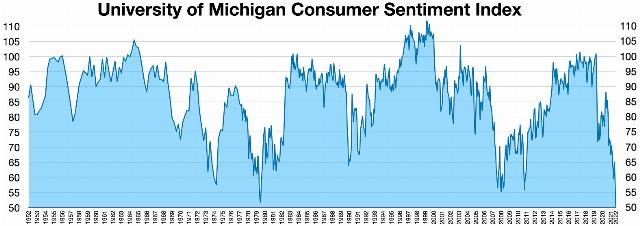Consumer Sentiment Survey: This too shall pass
Consumer sentiment numbers are being driven lower by a financial press that is littered with liberal naysayers. They may occasionally strain to pay lip service to the historic investments President Trump is securing, but usually with a negative slant that focusses on potential global upheaval. Their coverage is so pessimistic that individual investors are being swayed, with bearish sentiment rising.
Under President Trump, good economic news such as reshoring manufacturing and locally sourcing materials crucial to our national security is portrayed as bad news. So is gaining trade concessions from India and Mexico. By contrast, perceived bad news is inflated, with the word “stagflation” being uttered recklessly. The worst possible ramifications for tariffs are presumed as legacy media dwells on the “pain” that Trump suggested may accompany his “Liberation Day” transition.
It’s taking a toll. On Friday, 28 March, the University of Michigan released it’s highly anticipated consumer sentiment index -- it fell, but some have dismissed their data as overly partisan. Earlier in the week, the Conference Board released its monthly Consumer Confidence survey results showing that consumer confidence fell in March. The Conference Board survey is based on an online sample of about 300 households each month, and purports to measure consumer confidence in the economy, including buying intentions and inflation expectations.
In this moody media milieu, gloomy market coverage can impact that sentiment, becoming a self-fulfilling prophesy. Since much of individual investors’ wealth (even for “regular” folk) is derived from stocks (directly or indirectly), it’s natural to become a negative and nervous Nellie as loss aversion overwhelms prudent judgement. This further dampens sentiment as jittery markets flounder, and the downward momentum cascades.
As with the University of Michigan, one may reasonably doubt the Conference Board’s impartiality. They have been described as a “trusted source for statistics and trends, second only to perhaps the U.S. Bureau of Labor Statistics.” Yikes -- being second for statistics to the BLS is not a compliment. Have they even seen how wacky the BLS outputs are -- for example, their jobs reports are constantly revised?
Sure, some temporary economic pain may prevail, but we were on an unsustainable path, so better to course-correct now than later. We now have leaders who are courageous enough to transition us from a fake (pumped up by unsustainable government spending) to a real economy. Leftists will leverage for political gain the resultant dislocations as they dampen sentiment, even willing a recession as they put party above country.
A party, but the way, that churlishly chastens corporations and embraces wealth destruction. That sounds antithetical to American exceptionalism, but examples abound, including Minnesota Gov. Tim Walz celebrating Tesla’s stock drop -- despite state pension plans owning shares.
Given that BLS statisticians are so wayward, one probably shouldn’t trust the reliability of their reports, even after revisions. How, then, can one have confidence in the (second-placed) Conference Board’s consumer confidence numbers? In fact, despite the outsized market reactions to recent readouts, researchers have concluded that consumer confidence readings only marginally improve forecasting results. That is, “consumer confidence does not appear to have much additional, useful information beyond that contained in other common forecasting data.”
Consider this: “The Conference Board supports the critical race theory-influenced concepts of diversity, equity, and inclusion (DEI) in corporate settings.” Their effete emphasis on DEI is one reason to lose confidence in them. Likewise, if their dedication to environmental and social justice clouds their own sentiment, how can they impartially gauge consumers’ sentiment?
For now, the MSM’s prophesy is fulfilled -- the confidence trick is temporarily working. Sentiment readings are down and the stock markets are tanking. This time in private, Tim Walz and his ilk are probably dancing a jig with their iPhone stock app open. This sentiment too shall pass.

Image: Wikideas1
FOLLOW US ON
Recent Articles
- Democrats Trade Morality for Madness
- Bringing Immigration Policy into Focus
- Judicial Imperialism: The House of Boasberg and the Left’s War on Sovereignty
- Rebirth of Beauty and Faith
- Straight Talk Regarding Church and Society
- The Dos and Don's of Negotiating with Iran
- The Bodycam Presidency
- How Elon Musk Could Fix Medicare
- The Left’s Marxist Resistance
- The Whole World is Losing Factory Jobs
Blog Posts
- The intifada in Germany claims another victim
- A majority of Americans oppose defunding colleges that allow antisemitism
- What does it mean to be a Democrat today?
- The newest hate crime in England: ‘Speak English’ *UPDATED*
- Democrats have been wondering why they lost to Trump
- More cowbell: While insane leftists keep screaming, DOGE finds more outrageous spending
- Can the Iranians get the nuke?
- Something in the air, and it’s not carbon dioxide
- Public schools define ‘excellence’ differently than the rest of us do
- Assassination culture comes for America
- The courage of a female fencer
- The Democrats’ laughable foofaraw over Obama’s relocated portrait
- Real ID wouldn't be needed if state systems weren't so corrupted with illegals
- Residents of NYC’s famous Greenwich Village want their police back
- Oakland decides to clean up graffiti -- by fining the victims






